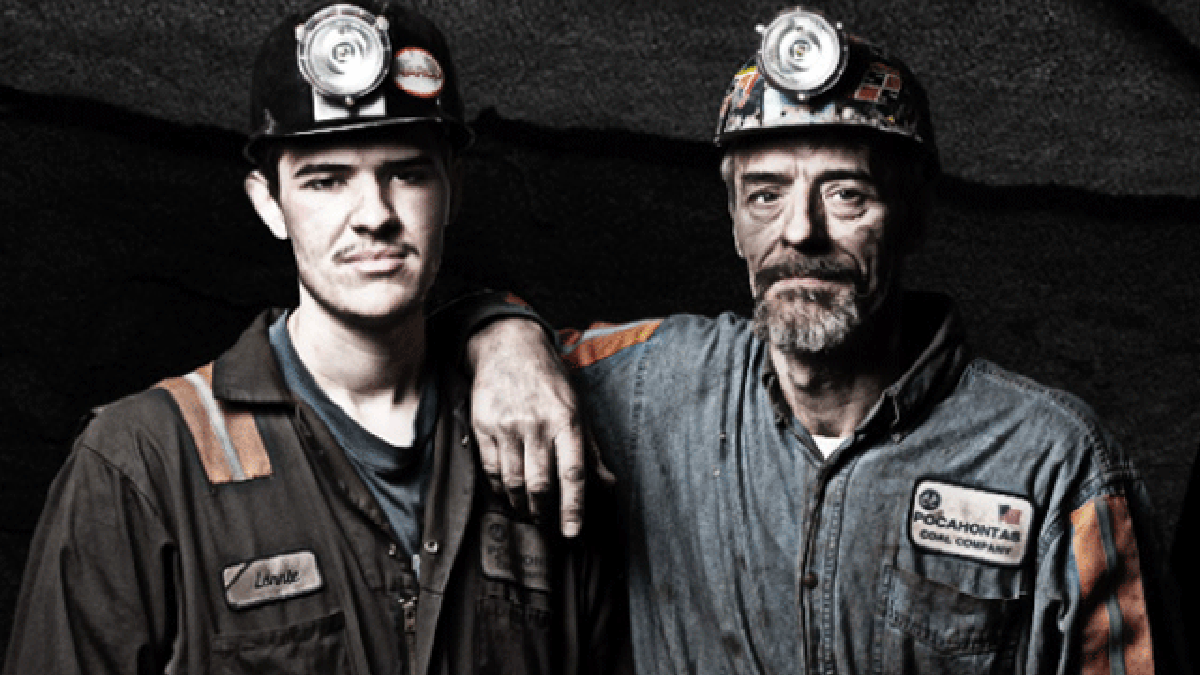
Workers on Spike's 'Coal.' (Spike TV/Scott McDermott)
The first episode of a reality show filmed in a southern West Virginia coal mine had real-world results: Federal inspectors who watched the Spike TV series have cited Cobalt Coal Corp. for activities they say endangered the miners.
In the debut of "Coal," a worker at the Westchester mine in McDowell County used the wrong tool -- a 12-inch pick hammer -- to pull down loose roof rock for a dramatic collapse that was caught on camera. The Mine Safety and Health Administration said the tool was too small for the job and put workers at risk of being struck by falling rock.
MSHA also cited Cobalt for moving the continuous mining machine when it wasn't cutting coal and allowing a worker to walk alongside, creating the potential for a crushing injury.
It's the first time MSHA has written a violation based on TV footage, spokeswoman Amy Louviere told The Associated Press.
"However, this is the first time that a documentary like this has been taped underground, to our knowledge," she said. "If violations are obvious, they will be cited."
The show debuted March 30 and was seen by 6 million viewers in the first week. The second episode aired Wednesday night.
The violations were written April 5, on the first anniversary of a massive explosion that killed 29 miners at Massey Energy Co.'s Upper Big Branch mine, another southern West Virginia operation.
Cobalt Chief Executive Officer Mike Crowder said he won't judge the motives of MSHA inspectors, but the citations don't make him regret doing the show. Even mistakes, he said, can become teaching tools.
Coal companies today rely mainly on low-quality, "very boring" videos to train miners in safety, he said. If nothing else, the Spike footage can be used to create more vivid clips that can help workers identify and avoid hazards.
"Coal miners and companies and folks like myself, it's our responsibility to keep our miners safe," Crowder said. "We should take these situations -- and mistakes, at times -- and work together."
The state Officer of Miners' Health, Safety and Training, which had obtained an advance copy of the first episode, cited Cobalt for similar violations even before the show aired.
In a March 23 notice, a state inspector said the potential of the continuous miner to pin a man against a mine wall reflected "an extremely high degree of negligence."
State records show inspectors also cited Cobalt and some individual workers for failing to wear the proper reflective clothing, which ensures a miner can be seen from all directions, and for failing to wear proper eye protection.
The state also cited Cobalt's miners for failing to wear their air packs, called self-contained self-rescuers, and for failing to have a cache of the devices within reach. The air packs produce oxygen through a chemical reaction and are designed to give miners enough time to escape from a contaminated atmosphere.
Both the state and federal violations resulted in safety meetings with the workers.
To shoot in the mine, 10 videographers trained for 80 hours and were certified as apprentice coal miners.
During the filming, which ran from Nov. 9 to Jan. 21, federal inspectors also cited the Canadian-owned company for 19 health and safety violations. There were, however, no accidents or serious injuries.
Cobalt mines a highly valuable metallurgical coal used in steelmaking, but the seam is notoriously thin, forcing miners to work in a space just 42 inches high some 600 feet underground. The tight confines are dramatic but atypical: The U.S. industry is largely dominated by corporations with massive mines that often have hundreds of workers and mining machines larger than houses.
Crowder said reaction to the show has been overwhelming and "passionately positive."
"It's been phenomenal. I would never have imagined there would be such activity," he said.
That includes a surge in demand from coal buyers.
"A good part of business in any industry is your network connections, and our network connections have gone from bottom rung to top rung," he said. "People know who Cobalt Coal is now, and they'd like to do business with us."
People also want to work for him. Crowder said he's had nearly 80 resumes from would-be employees since the first episode.
The show has become a focal point for the industry, too. It was the topic of much discussion at this week's coal mining symposium in Charleston.
"There's so much pride," Crowder said. "There's never been an opportunity like this to tell the coal miners' story -- what they do and how they do it and what coal miners do for America."














































